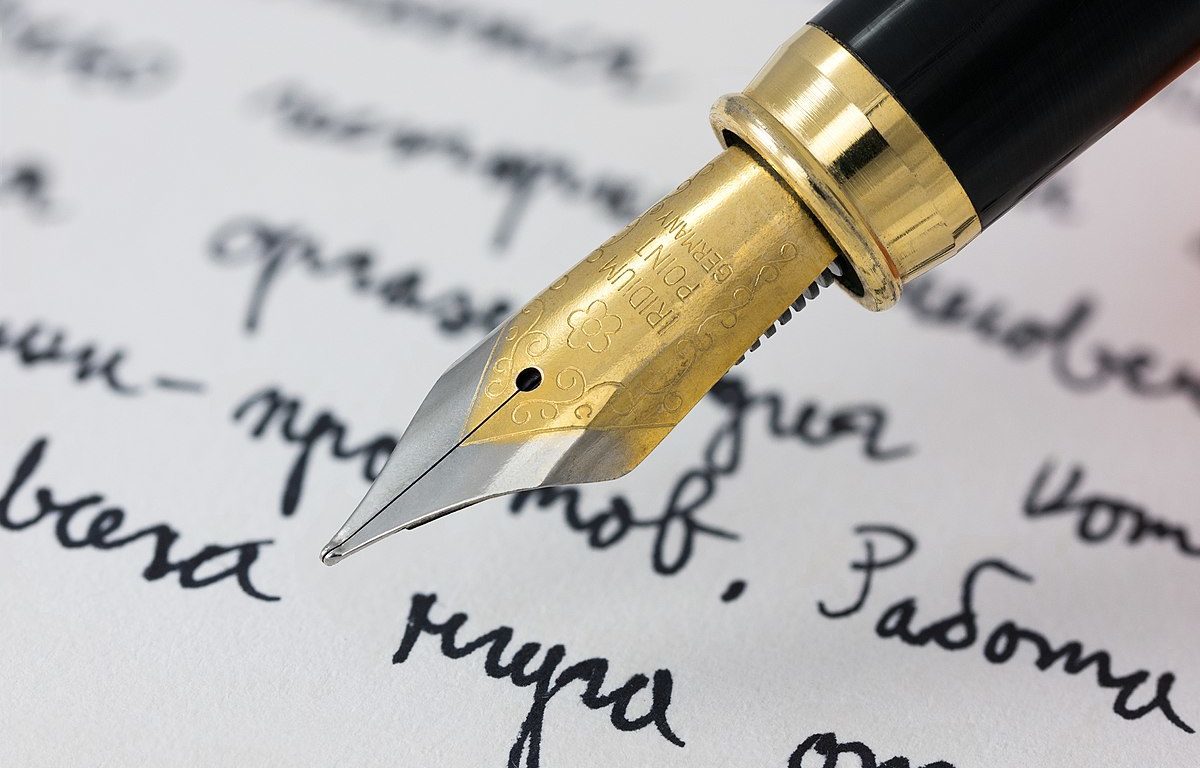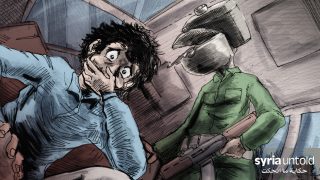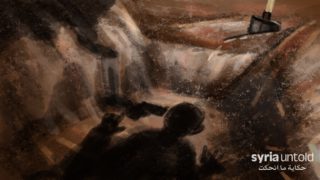This article is part of a SyriaUntold series featuring daily life stories from Damascus.
Hammam woke up in a panic as the doorbell rang at 6:00 am sharp. He had celebrated his 29th birthday a few days ago, but today, he bolted out of bed as if he had been stung by a scorpion. He looked at the time, then ran barefoot to the door so as not to make a sound.
His heart was racing, his legs quivering, his stomach was in knots, and his breath labored. He looked through the door’s spyhole to see his Pakistani neighbor still in his pajamas on the other side of the door. It took him a few seconds to realize that he was in the United States, in New York to be exact, and not in Syria.
If your doorbell rings in the wee hours of the morning here, it doesn’t mean it’s a security raid coming for your arrest. It’s probably your neighbor, annoyed at something or with a pressing issue to discuss. Hammam felt light headed. The adrenaline rush faded, and he felt an incredible urge to go back to sleep. Instead, he composed himself and opened the front door, sweat pouring out of his pores.
In his broken English, his neighbor asked if he had a wrench. His wife’s ring had fallen behind one of the kitchen shelves and she couldn’t get to it. Hammam looked blankly at his neighbor, before staggering in the direction of the kitchen. He returned with a wrench in hand and gave it to his neighbour. The latter thanked him and returned to his apartment.
Hammam returned to the bedroom and laid down next to his wife, Houda. He tried to fall asleep again, but he couldn’t.
Of all the goddamn things that have happened to Hammam during his five-month stint in jail in 2012, his biggest fear was of surprise morning visits. Those were etched deeply into his psyche. His scabies was fully treated after two months; the wounds and burns caused by the electric shocks were almost gone after six months. The only reminder of those was a small scar on his left thigh. His shoulders still sometimes hurt after permanent damage was caused by being forced to hold stress positions for long hours when he was hung by his wrists.
In fact, he was able to overcome – to a large extent – the psychological trauma he suffered during and after his arrest caused by the atrocities he witnessed at the Air Force Intelligence branch: people being tortured to death, the complete disregard for human life, and the evil that emerges when people are put through endless violence, humiliation, and brutality.
Hammam had been a doctor in one of the public hospitals, yet at the same time, he treated the wounded, both civilians and fighters, in rebel-controlled areas. He had always been an empathic person, interested and driven to help in the public sector. He was a volunteer in many civil organizations as well as charities. At the beginning of 2011, he was heavily involved in the revolution, both as a protestor and as a doctor. Initially, he tried to help via the traditional avenues, working only with licensed organizations. However, the restrictions placed on those entities as well as the interference of the security apparatuses hindered his desire to offer real help to those in need. As a result, he enlisted in secret rebel gatherings that worked in civil action as well as provided aid and medical services.
His surgical kit was still on the table. All they had to do was open it to see the blood and the extracted bullet.
At the onset of 2012, an informer in Saqba in Eastern Ghouta led to Hammam’s arrest. Hammam had gone to bed exhausted after a long night treating a patient with a bullet wound at a house in the Barzeh neighborhood. He was so tired that night that he didn’t even bother cleaning up his surgical kit, leaving the patient’s blood on his utensils.
At 6:45 am, the doorbell rang. Hamman, without fear or worry that morning, opened the door half asleep. Immediately, five security agents started beating, kicking, and cursing him. They turned his sweater inside out, covering his head as he heard them ransack his house. Only then he realized he was in big trouble: his surgical kit was still on the table. All they had to do was open it to see the blood and the extracted bullet.
Hammas was a devout and committed Muslim. He surrendered to his fate, hoping his death would be swift and painless all the while reciting Quranic verses such as, “And we have put before them a barrier and behind them a barrier and covered them, so they do not see,” in hopes it would render the security men blind. As soon as they were done with searching the house, they led Hammam to the backseat of a car and ordered him to place his head between his knees. He heard the engine start and go on for what seemed like an eternity, even though it was only a few minutes. Then one of the men dragged him by his long, straight hair out of the car, cursing his mother and his god.
In the beginning, he had a quick preliminary interrogation session during which the officer in charge went through Hammam’s belongings that were retrieved from his house. That’s when he realized they hadn’t found the surgical kit. A strong feeling of divine intervention washed over Hammam, and he knew he would leave this place safely, one way or another.
He was then taken to a room with a black metal door. Hammam entered to see tens of youth and adult men crammed into a room no bigger than eight meters square. Some were standing, others were lying down or squatting. It was stuffy inside. The smell was unbearable even though it was spring. One of the older men came forward and told Hammam: “Do you know where you are? You’re at the Air Force intelligence branch in Al-Mazzeh.”
Hammam decided to stay positive for as long as he could. He didn’t resist the beating of his interrogators, and he begged them to stop because he knew they loved to see men beg and plead. His tormentors would inflict more harm on the men who refused to scream out in pain.
He admitted to the things they were able to prove against him, such as his position being pro-opposition which was clear from his personal Facebook account. Luckily, the informer had little information about his work within the pro-rebel zones. All he knew was that Hammam was a doctor who frequented areas in Eastern Ghouta. This allowed Hammam to play the interrogation to his advantage, sticking to the story that he only took part in demonstrations without giving away that he offered medical services to those in need.
His tormentors would inflict more harm on the men who refused to scream out in pain.
For two months, the interrogation with its torture and beatings took almost no toll on Hammam. However, he panicked whenever the soldier came for him at 7 a.m. to take him to the interrogation room located somewhere in the Al-Mazzeh military airport. He hated what the new day brought: more terror, pain, and the unknown. He became afraid of falling asleep at night so as not to wake up in the same manner every morning. So he resorted to sleeping after his interrogation session ended and after lengthy negotiations to switch his turn with those who organized the sleeping schedule in his cell.
After signing on a “blank confession,” Hammam waited for a month before appearing in front of a military court. During that time, he took note how the inmates brutally treated each other, and how they brawled over everything from food, to sleeping slots, to bathroom turns. He saw how they gloated when one of the prison guards cut his long hair, and how some hated him simply because he was from Damascus.
It was an incredibly hard month that tested his faith in God, his faith in the revolution for which he was arrested, and his faith in the rebels he had helped and treated. It was also a very hot month, to the extent that the inmates’ sweat was a few centimeters deep on the cell floor. The detainees had to mop the floors just so they could sit and lie down.
In June 2012, Hammam appeared in front of a military court after a 90-day stint at the Air Force Intelligence branch. Luckily for him, the Counter-Terrorism Court had not been created yet. He was transferred to the Adra central prison where he spent two additional months before being released while he awaited trial. Hammam returned to his house to find his surgical kit as he left it on the table.
In those days, Hammam was sure God was watching over him and protected him from what should’ve been a lot worse than he had been subjected to. When the Counter-Terrorism Court came into effect, his file was meant to be transferred to that court. However, his file went missing. Just like that, and without having to try and hide it or misplace it, and without having to bribe anyone for it to “go missing,” Hammam’s file vanished into thin air as if it had never existed.
For Hammam, that wasn’t luck but providence. God had sent him guardian angels to be with him every moment of that hard experience. Soon, he met a young woman with whom he fell in love and married. They lived in Damascus for a while before Hammam received a scholarship to study in the US. He applied for his visa at the American Embassy in Beirut just as Donald Trump was inaugurated as president of the USA in early 2017. Trump had issued a decree to reject the visas of several nationalities, Syrian being one of the first to be placed on that list. While many others had their visas rejected, Hammam and his wife were granted theirs during their first interview. Soon, they travelled to the US where he enrolled in university.
Everything went better than planned, but the one thing Hammam could not get over were his morning terrors: from that morning raid to all the other mornings when his ride would arrive to take him to his torturers at the interrogation branch at the Al-Mazzeh airport.
Hammam hasn’t had a good night’s sleep since, not in Adra prison nor after his release nor even when he managed to live on a different continent. Nothing helped: not morning prayers, not sleeping pills, not even seeing a therapist. Even the thought of his guardian angels was problematic as it only stoked the feelings of survivor’s guilt mangled up with the fear that his luck was about to run out. That fear soon turned into a deep depression and a strong sense of alienation that could not be shaken off. Neither prayer nor group therapy for dealing with phobias, which he tried to attend as often as possible, helped.
The only way for Hammam to overcome his morning terrors and depression would for the interrogation branch to vanish; for the air force and military intelligence to vanish; and for informants, security personnel, and prison guards to disappear along with their cables and sticks – like a nightmare that you awake from in the morning and it dissipates. Only then would the morning be tolerable again, even if it means an early doorbell ring because of an annoying neighbor.






